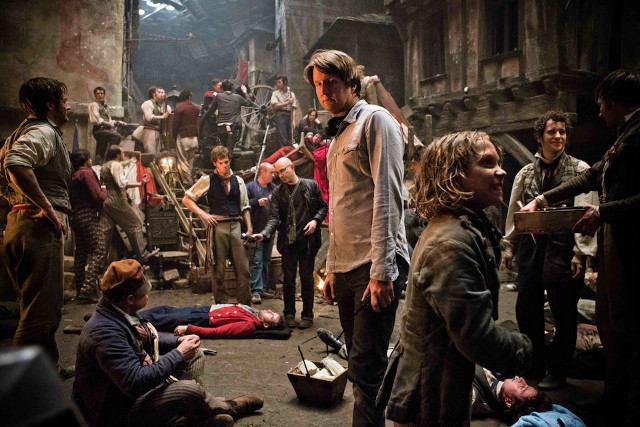SUMMARY
This is AI generated summarization, which may have errors. For context, always refer to the full article.

MANILA, Philippines – Tom Hooper’s “Les Miserables” promises to be not only a breathtaking adaptation of Victor Hugo’s novel but also a totally different take on musical film adaptations in general.
Critics in the US alternately slammed and praised Hooper’s bold directorial decisions, starting with his decision to record his actors’ singing live instead of the traditional route of prerecording.
David Chen of slashfilm.com says that this creates two effects:
First, the singing sounds naturally rough and imperfect creating, on one hand, a startling immediacy that allows viewers a more intimate connection with the character and, on the other, an almost unlistenable soundtrack when separated from the visuals of the film.
Second, with live recording, viewers see the actors’ efforts to reach every note of their songs. Remember that many of the actors never received any formal lessons save for the months of voice training for “Les Mis.” The film shows Anne Hathaway gasping through “I Dreamed a Dream,” Eddie Redmayne’s trembling chin as he thunders through “Red and Black,” and Russell Crowe’s straining tendons as he completes “Stars.”
Watch the international trailer here:
ALSO READ: ‘Les Mis,’ ‘Argo,’ ‘Homeland’ top Golden Globes winners
The effect may be distracting to some and powerfully moving for others.
These physical demonstrations of effort allow for subtleties in performance and a connection between actor and song that you just don’t get with other musical film adaptations.
Tom Hooper, in an interview on BBC, explains this connection he tried to establish: “The problem with using [pre-recorded music] is an actor is having (sic) to spend a lot of their (sic) brainpower in syncing up with what they did… Generally, if you’re an actor, if you’ve been working hard on a part, you’ll get to this place and you’ll be singing along to something you did two months ago and you’ll hate it.
“You’ll kind of think Well, that’s what I did two months ago, but now my understanding of the part has grown. And you’re kind of stuck singing along to something that may be making you cringe… It sets up a kind of white noise in the actor’s head, which detracts from the actor’s performance.”
ALSO READ: Adam Lambert’s ‘Les Mis’ review on Twitter
Second in controversy to the decision to record singing live on set is Hooper’s decision to depart from the camera angles and mise-en-scene typically associated with musical films. If you’ve watched “Chicago,” “Moulin Rouge,” and “Singin’ in the Rain,” you’ll mostly remember the wide shots of minutely choreographed dance numbers and a camera that stays put as the actors move within its frame, as if to mimic how the scene would look if played on a stage.
Hooper’s “Les Miserables” is distinctly cinematic. Instead of staying put and giving the audience a God-like view of everything, the wide-angle camera follows actors like a dog taking the viewer into the thick of action.
ALSO READ: Les Miserables, according to the critics
Hooper maintains the camera’s shallow depth-of-field, focusing on the character right in front of you. Character close-ups abound, allowing for subtleties of expression unachievable in a stage production. The effect as a whole immerses the viewer and makes them a part of the drama instead of a detached viewer watching a separate stage.
To be sure, this can turn off some viewers. In his article in The Atlantic, Christopher Orr criticizes, “The second or third time we watch a face fill the screen with notes tender or tragic, the effect is genuinely arresting. The 22nd or 23rd time…”
But you have to tip your hat to Tom Hooper for his trailblazing efforts in rethinking the way musicals are adapted for the screen.
His “Les Miserables” may not have impressed all critics but it has done something more important: Widened the realm of possibility. – Rappler.com
You may also want to read:
Add a comment
How does this make you feel?
There are no comments yet. Add your comment to start the conversation.